Peugeot is the latest brand to confirm it is halting development of diesel engines until the market stabilises, and it may remove them altogether if demand continues to fall.
The PSA Group’s product director, Laurent Blanchet, told Autocar at the Paris motor show that the future of diesel is “uncertain” and that “we will have to see if the market is going to delete or give up on diesel”.
The company has recently launched a new 1.5-litre diesel engine that meets the most stringent emissions regulations for the next few years but may not be adapted beyond that.
“We have decided not to develop more evolutions of diesel technology, because we want to see what's going to happen,” Blanchet confirmed.
Speaking separately, Peugeot CEO Jean-Phillipe Imparato admitted that the company had "made a mistake with pushing diesels," as its aggressive development and substantial investment may not pay off in terms of the fuel's future market share.
The market share of diesel engines in European car sales has fallen from around 50% at the start of 2017 to roughly 36%. Fallout from the Volkswagen Dieselgate emissions cheating scandal is cited as one reason buyers are staying away, alongside threats of increased taxation and concerns over particulate pollution.
Other manufacturers, such as Kia, have also halted further diesel development.
Blanchet continued: “We have decided that, if in 2022 or 2023 the market is, say, 5% made of up diesel, we will give up on it.
"If the market is 30%, the question will be very different. I think nobody can say yet where the market will be. But what is clear is that the diesel trend is going down.
“As you know, we have launched a new 1.5-litre diesel engine, which will keep things going for now. The question is not our products, because we know we have very good diesel engines and we know that diesel is very competitive in terms of CO2 emissions.”
Peugeot’s focus now is on electrification, Blanchet said. The PSA Group plans to offer a plug-in hybrid or electric version of every Citroën, DS, Peugeot and Opel/Vauxhall model launched from next year onwards.
Peugeot has already presented plug-in hybrid versions of its 3008, 508 and 508 SW, with more to come. The focus for smaller models, such as A and B-segment superminis, will be on offering battery electric powertrains in addition to petrol engines.





Join the debate
Add your comment
I would have though that most
I would have though that most 508s were still diesel powered, as a lot will be used to cruise up and down motorway and autoroutes, well away from town centre and possible restrictions.
The VW advert
that keeps appearing on this page saying "take a look at the golf" carries a certain amount of irony.
Wrong solution?
I can't help feeling that we're attacking the problem from the wrong end. Instead of attempting to make diesel (and petrol) engines so clean so that we can continue driving them into town, wouldn't it be better to stop ALL cars from using town centres. All combustion engine cars create pollution - and regardless of power source they all cause congestion and are a hazard to pedestrians. This could be an opportunity to make our town centres cleaner and safer.
LP in Brighton wrote:
Yep, totally agree. Car-less town-centres would be fantastic. Get people out on their feet, footfall for the high-street shops, less obesity, etec. etc. Happens in a few places (Pontevedra)
Alas it would never happen in the UK - we'd have some nanny-state rubbish